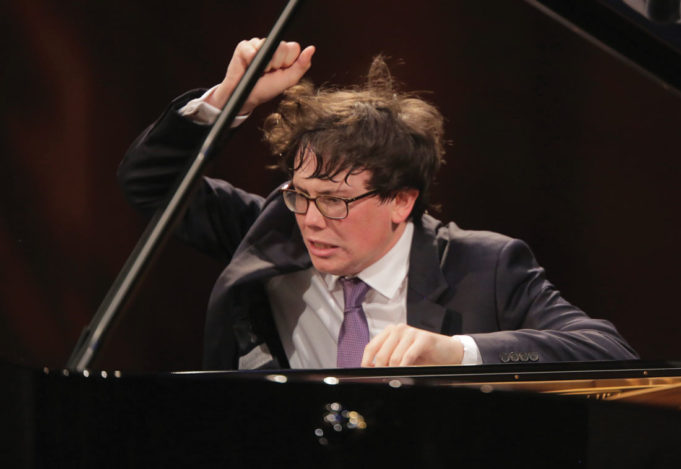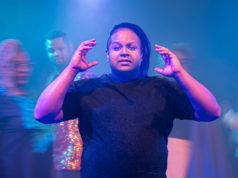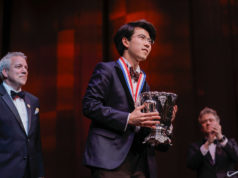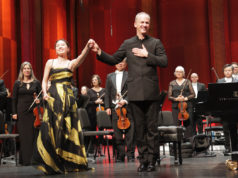What is there to say about hearing 30 pianists in four days? I use my experience going to film festivals for this publication to help guide me through, and I look for anything that doesn’t bore me. Some people don’t want to admit being bored at a classical music concert, but I don’t mind saying that that happens to me regularly, just as it does when I go to movies. When it comes to art, anything is better than boredom. I appreciate something that angers me, frustrates me, makes me think, or makes me laugh for a stupid reason far more than something that merely wastes my time. There was plenty of all those things, as well as some mind-blowing recitals, on offer during the Van Cliburn International Piano Competition’s first four days.
The flags of 15 countries hang from the mezzanine of Bass Hall to represent the nations that have sent pianists to Fort Worth. Some of those countries made strong showings in the early going. Italy had only two competitors, but for the third straight contest, it had strength to make up for what it lacked in numbers. Luigi Carroccia played a Chopin Polonaise-fantaisie that was superbly colored, and while his colors got smudged in his subsequent interpretation of Scriabin’s Third Piano Sonata, his un-Russian take on the Russian master’s explosive work was nevertheless absorbing. His compatriot Leonardo Pierdomenico unearthed a delightful rarity in Clementi’s Fifth Piano Sonata and gave one of the best performances of Marc-André Hamelin’s Toccata on L’homme armé, the madcap showpiece commissioned for the competition.
Meanwhile, the home country was well-represented by Kenneth Broberg’s clean, unfussy interpretations of Samuel Barber and César Franck, as well as by teenager Daniel Hsu’s technical display in Liszt’s Réminiscences de Don Juan. Our Canadian neighbors had their own wonderkid in Tony Yike Yang, giving clear, assured performances of difficult sonatas by Beethoven and Prokofiev.
However, a casual classical music fan might think from this preliminary round that South Korea is the world-destroying powerhouse when it comes to pianists, with four of its five entrants moving on to the quarterfinals. (Meanwhile, Busan native Park Sun-a competed for America.) Kim Hong-gi won fans with his attractive playing even when the attractiveness was inappropriate to the music, and fellow Seoul native Lee Eun-ae may have been the only Korean who wasn’t advanced to the next round, but she nevertheless outplayed some competitors who went further with Haydn’s Sonata in B-flat major and Debussy’s étude for composite arpeggios. Kim Su-yeon also recovered from a slow start to beguile the audience with Rachmaninov’s transcription of Fritz Kreisler’s Liebesfreud, diving into the swing of the Viennese waltz. Most impressive was Busan’s Kim Da-sol, possessing one of the most refined techniques I’ve seen in five competitions and showing fine musical judgment to go with the mechanism. None of the Kims are related to one another, by the way.
From other countries, Britain’s lone representative, Martin James Bartlett (who, like every other young white Englishman who wears glasses, is destined to be compared to Harry Potter), charmed the crowds with his vivid if sometimes undisciplined accounts of Bach and Schubert. From a former British colony, Hong Kong’s Rachel Cheung brought her own brand of rarefied musicianship to Schubert and Debussy. Croatia’s Aljosa Jurinic contributed deep delicacy in the form of Debussy’s Rêverie but cut loose to play a version of Liszt’s Hungarian Rhapsody No. 11 that was great fun.
One of the pleasures of the Cliburn is hearing novelties that haven’t been played by untold numbers of others. Sergey Belyavskiy introduced many in the crowd to Taneyev’s Prelude and Fugue in G-sharp minor, while fellow Russian Yury Favorin took Prokofiev’s Opus 2 études and Tchaikovsky’s Opus 10 pieces out of mothballs to overpowering effect and Taiwan’s Chen Han dazzled his audience with Elliott Carter’s Caténaires. Poland’s Julia Kociuban found a bright spot on her program with an idiomatic performance of Karol Szymanowski’s sorrowful Étude in B-flat minor.
Among the musicians who were eliminated in the first round, 2009 Cliburn semifinalist Nikolay Khozyainov showed great technical flair in pieces by Chopin and Rachmaninov, even if he seemed to be gassed in the latter half of his recital. Romania’s Alina Bercu gave creditable renditions of Bach and the Hamelin toccata as well. Either of them would have made better quarterfinalists than some who advanced. By the time this article appears, the competition’s quarterfinal round will be over and the semifinalists will be known, but already the first round of this reformatted Van Cliburn has left an impression on Fort Worth.












